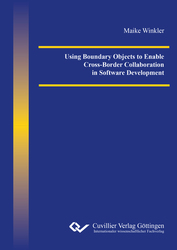| Areas | |
|---|---|
| Serie de libros (97) |
1381
|
| Nachhaltigkeit |
3
|
| Gesundheitswesen |
1
|
| Letra |
2370
|
| Medienwissenschaften | 16 |
| Teología | 57 |
| Filosofía | 102 |
| Derecho | 423 |
| Economía | 852 |
| Ciencias sociales | 417 |
| Ciencias del deporte | 48 |
| Psicología | 233 |
| Educación | 190 |
| Historia | 183 |
| Arte | 111 |
| Ciencias culturales | 166 |
| Literatur | 117 |
| Lingüística | 88 |
| Ciencias Naturales |
5407
|
| Ciencias Ingeniería |
1798
|
| General |
98
|
|
Leitlinien Unfallchirurgie
5. Auflage bestellen |
|
Erweiterte Suche
Using Boundary Objects to Enable Cross-Border Collaboration in Software Development (Tienda española)
Maike Winkler (Autor)Previo
Lectura de prueba, PDF (150 KB)
Indice, PDF (110 KB)
To date, the way in which software is developed has undergone considerable changes. It is well known that successful software development projects require diverse team members with specialized knowledge pools to leverage each other’s knowledge, solve problems and produce ideas collaboratively to accomplish software development tasks. While these specialized pools of knowledge are essential for software development, they create knowledge boundaries which impede cross-border communication and collaboration. Addressing such knowledge boundaries is particularly difficult when clients outsource software development projects to external vendors in offshore regions. The knowledge asymmetries between client and vendor employees are often extreme and they are geographically distributed. The three research papers included in this book provide a better understanding of how and why knowledge boundaries can be bridged and how co-created ideas can be generated over time. The implications for successful software development projects in offshore settings are highly relevant for theory and practice.
| ISBN-13 (Impresion) | 9783736993204 |
| ISBN-13 (E-Book) | 9783736983205 |
| Formato | A5 |
| Idioma | Inglés |
| Numero de paginas | 142 |
| Laminacion de la cubierta | mate |
| Edicion | 1 Aufl. |
| Lugar de publicacion | Göttingen |
| Fecha de publicacion | 28.07.2016 |
| Clasificacion simple | Tesis doctoral |
| Area |
Economía
Informática |
| Palabras claves | Boundary Object, Cross-border collaboration, Software Development, offshoring |








